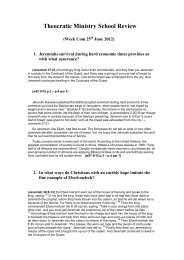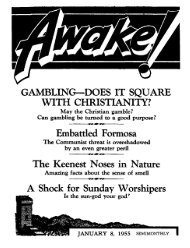1964 Awake! - Theocratic Collector.com
1964 Awake! - Theocratic Collector.com
1964 Awake! - Theocratic Collector.com
You also want an ePaper? Increase the reach of your titles
YUMPU automatically turns print PDFs into web optimized ePapers that Google loves.
over the often dangerous and rugged terrain<br />
that Herodotus covered.<br />
Enterpri8ing Explorations<br />
One very young adventurer who fired<br />
the imagination of many, and whose re.<br />
markable chronicle of his experiences gave<br />
impetus to rewarding European discoveries,<br />
was Marco Polo. In 1271 (A.D.),<br />
when only seventeen years old, he traveled<br />
with his father and uncle to China, where<br />
he became an agent and favorite of the<br />
Mongol emperor Kublai Khan. The Palos<br />
were the first Europeans to visit much of<br />
the territory they traversed on the journey,<br />
such as the Gobi desert. Marco Polo lived<br />
in China for seventeen years in luxury as<br />
an adviser of the emperor, then he returned<br />
to Venice. He arrived in a tattered<br />
and grimy fashion after his long journey<br />
and was promptly jeered by the populace;<br />
even Polo's friends failed to recognize him,<br />
after so long a sojourn in the Orient, and<br />
he was denied entrance to his house.<br />
Undaunted, Marco invited many Venetians<br />
to dine with him and, freshly bathed<br />
and lavishly dressed, he called for his tattered<br />
clothes to be brought. To the amaze·<br />
ment of his guests, Marco ripped open the<br />
seams of the garments to let loose a flow<br />
of rubies, sapphires, garnets, diamonds and<br />
emeralds. His book, The Travels of Marco<br />
Polo, is one of the most famous travel<br />
books in history and was for a long time<br />
the only existing source in Europe of in·<br />
formation on the geography and life of the<br />
Far East. It was Polo's book that helped<br />
arouse in navigator Christopher Columbus<br />
an interest in the Orient and which resulted<br />
in his discovery of America.<br />
Disappointment for some adventtu'ers<br />
has resulted in some strange turns of<br />
events. Captain James Cook was sent by<br />
the British Admiralty to look for a passage<br />
across Northwest America, but he found<br />
MARCH 22, <strong>1964</strong><br />
no passage and no gold-only sea-otter<br />
skins given to him by the natives of Vancouver<br />
Island, where he had anchored his<br />
ship. This tum of events sent the disappointed<br />
Cook and his men to Asia. Upon<br />
reaching the Asiatic coast, the Chinese<br />
tradesmen spotted the furs and bid fantastic<br />
prices for them. Unwittingly the Englishmen<br />
had found a rich trade where<br />
furs could be converted into gold. When<br />
word of the bonanza reached England, adventurers<br />
by the score joined expeditions<br />
to get in on the windfall.<br />
Enterprising Spaniards had concentrated<br />
in South America. Francisco de Orellana<br />
took part in the conquest of Peru<br />
and then explored the entire length of the<br />
Amazon River. He was also the first to<br />
cross the South American continent. Back<br />
in Spain, Orellana embellished his story<br />
with the description of an incredible race<br />
of female warriors of whom the natives,<br />
as he understood them, had told him and<br />
who were named after the Greek mythological<br />
Amazons. So the river Amazon got<br />
its name.<br />
When the Spanish adventurer Cortes<br />
conquered Mexico, he tried to convert Montezuma,<br />
the Aztec emperor, to Catholicism.<br />
In arguing for the conversion, Cortes<br />
<strong>com</strong>pared the Aztec practice of human<br />
sacrifice in connection with their religious<br />
rites with the rite of the Catholic mass.<br />
Montezuma replied that he found the Aztec<br />
custom of sacrificing humans less revolting<br />
than eating the flesh and blood of the god<br />
in the eucharist. The crafty Montezuma<br />
managed to secrete much of the Aztec<br />
treasures from Cortes, and they are said<br />
to remain hidden to this day.<br />
Unexpected Adventures<br />
In the nineteenth century, a spirit of<br />
scientific discovery became evident. Rather<br />
than gold, many sought new species of<br />
birds and animals or unknown tribes. Al-<br />
25




